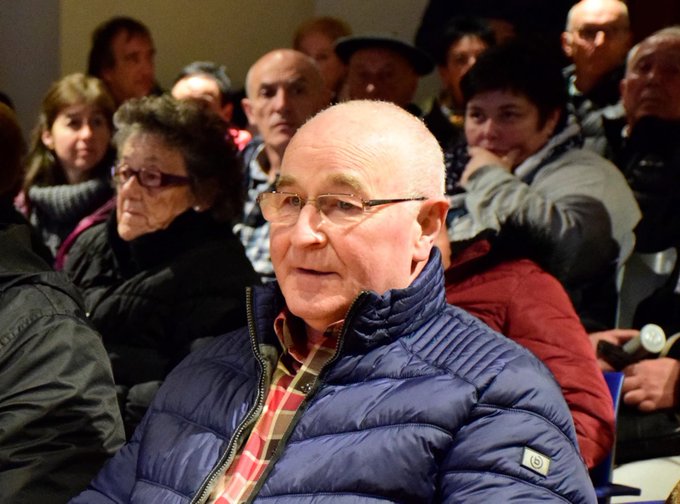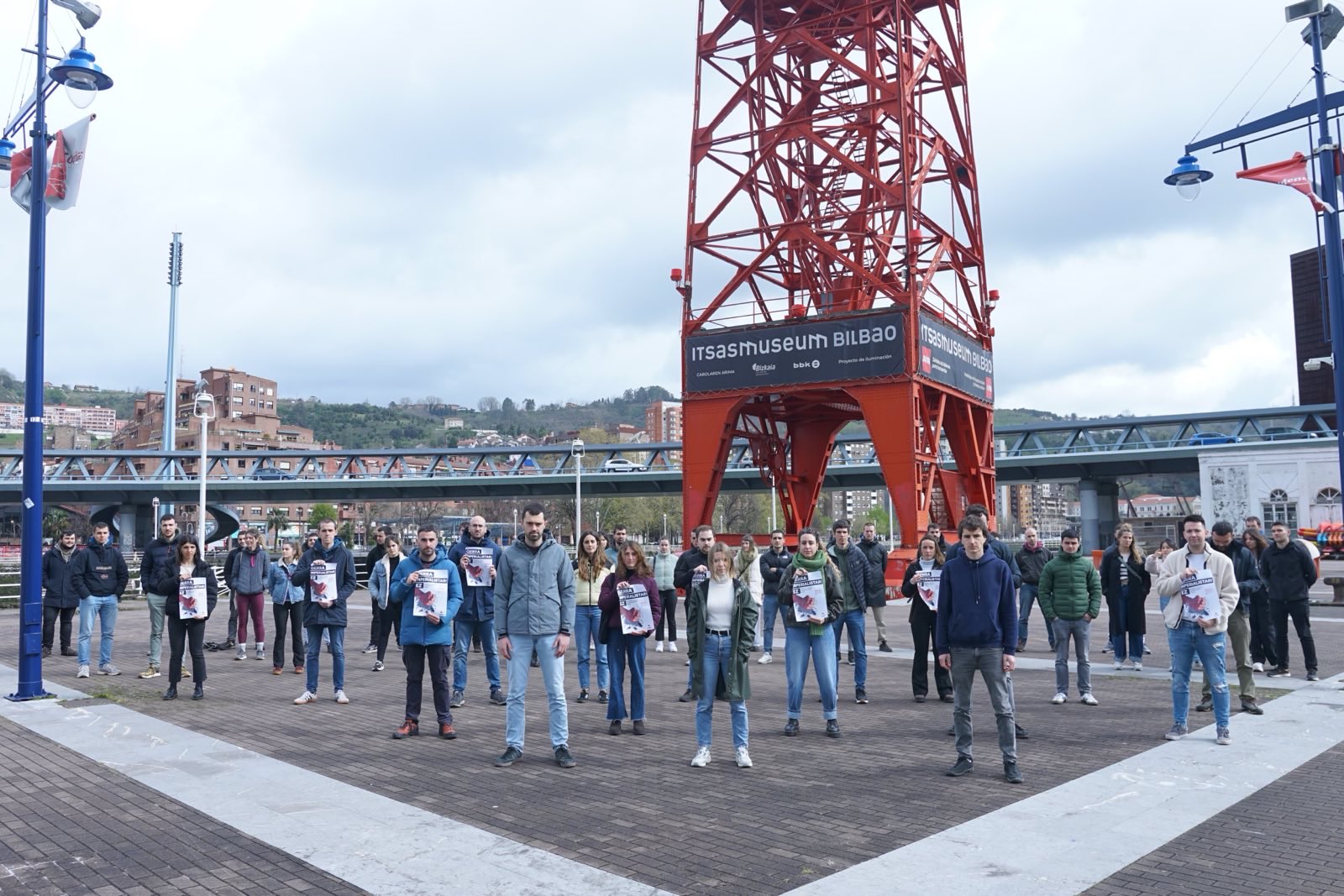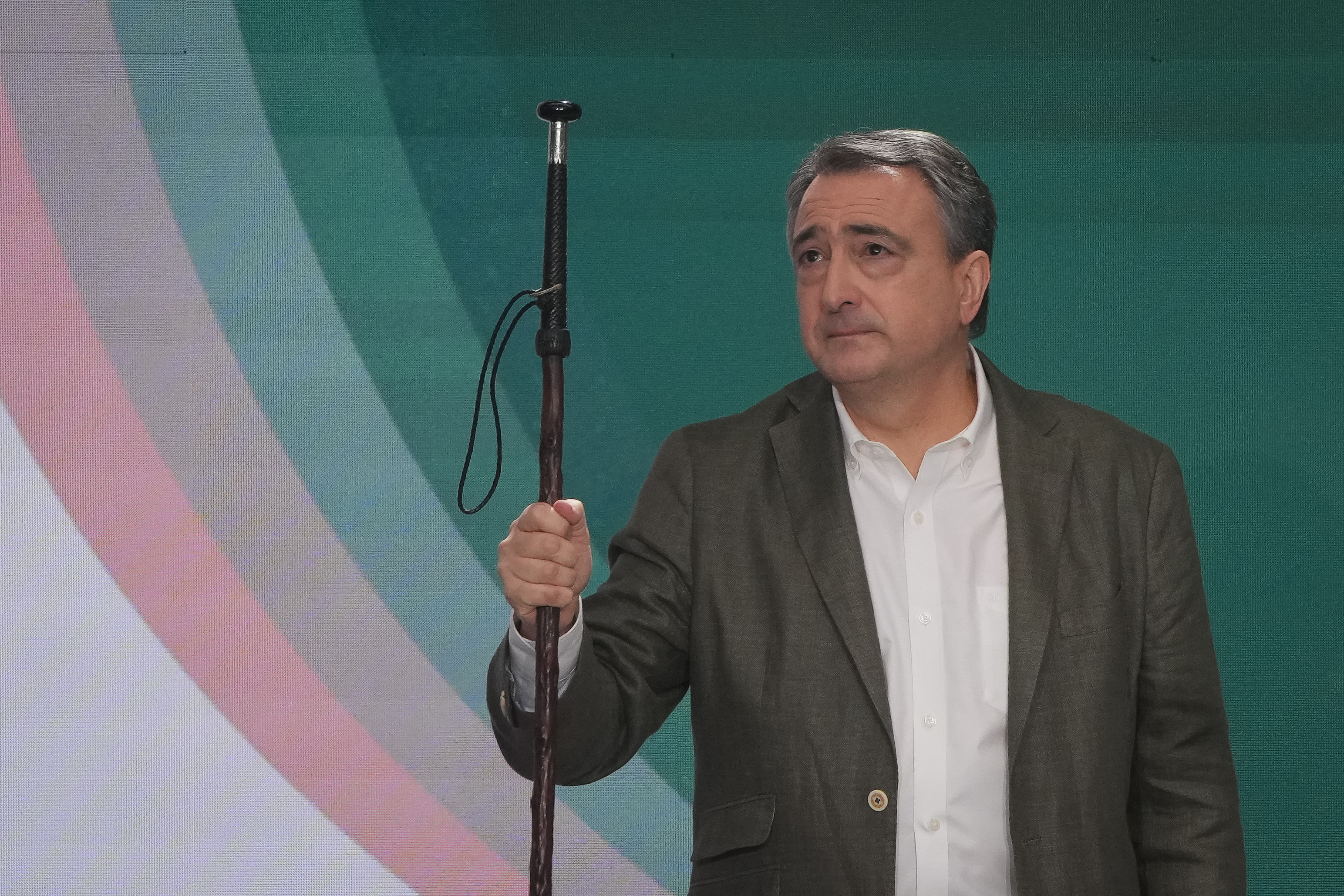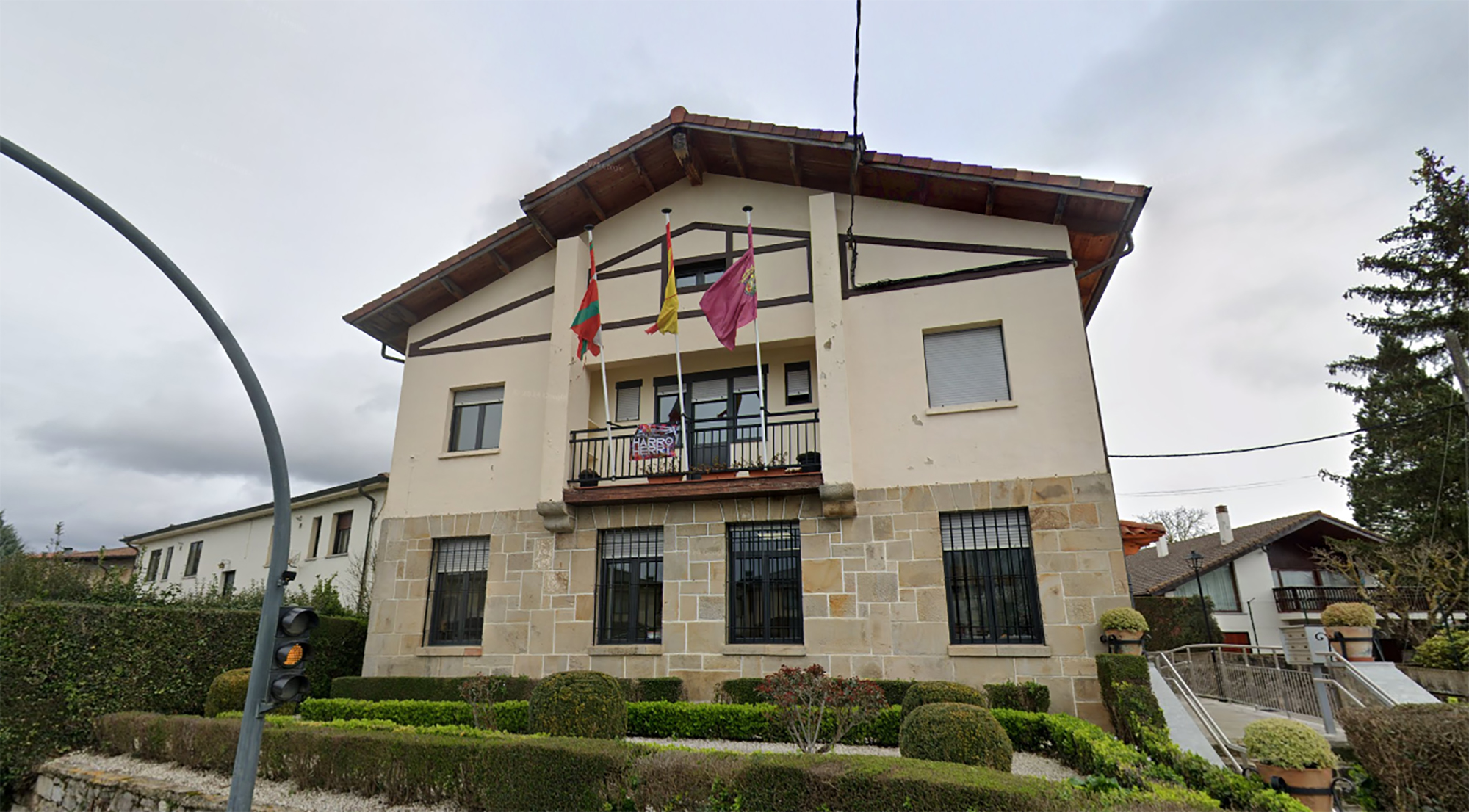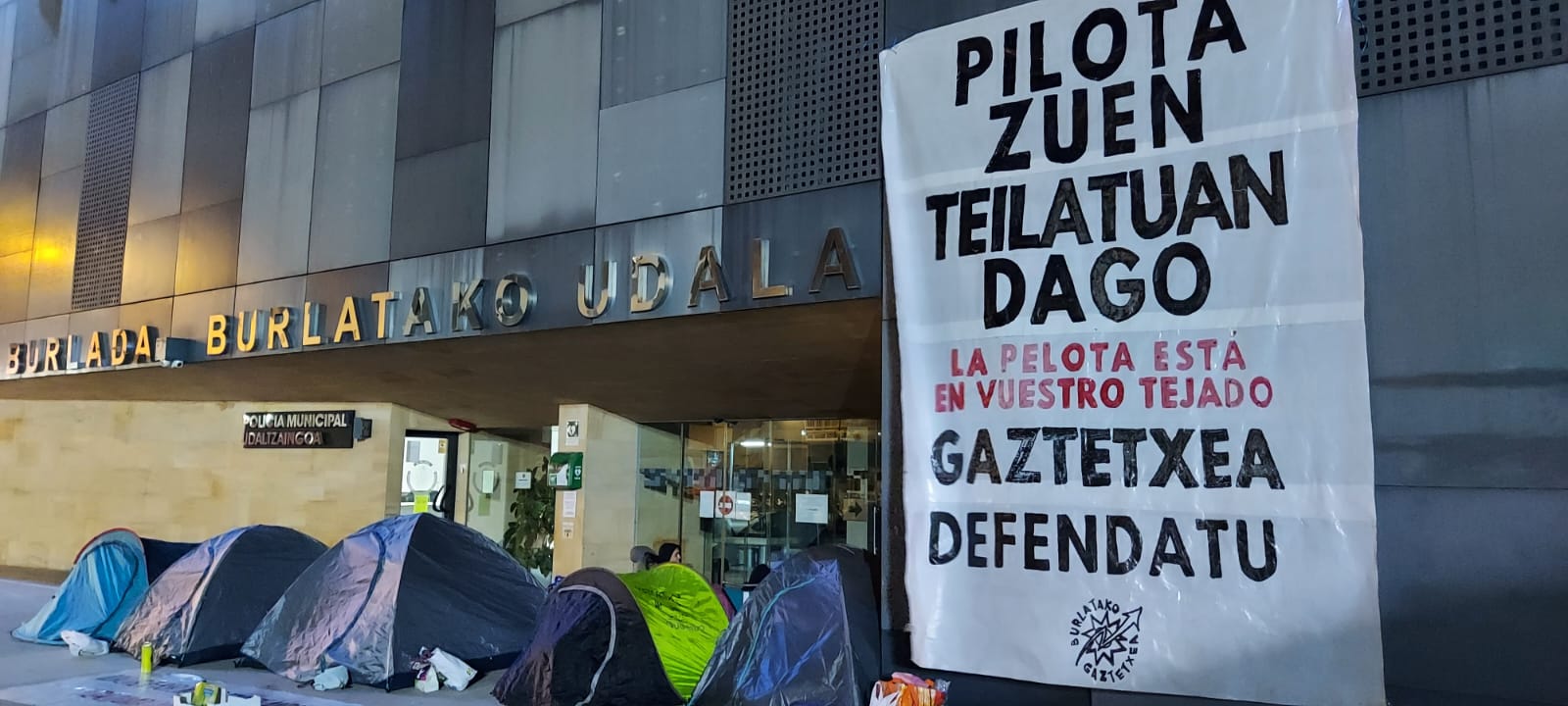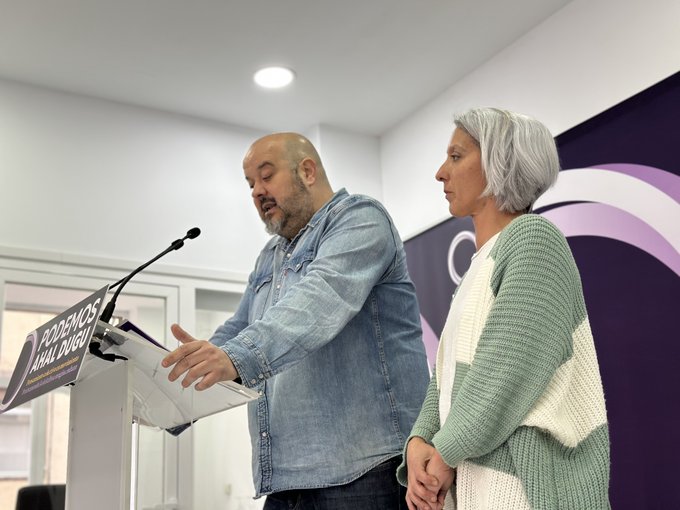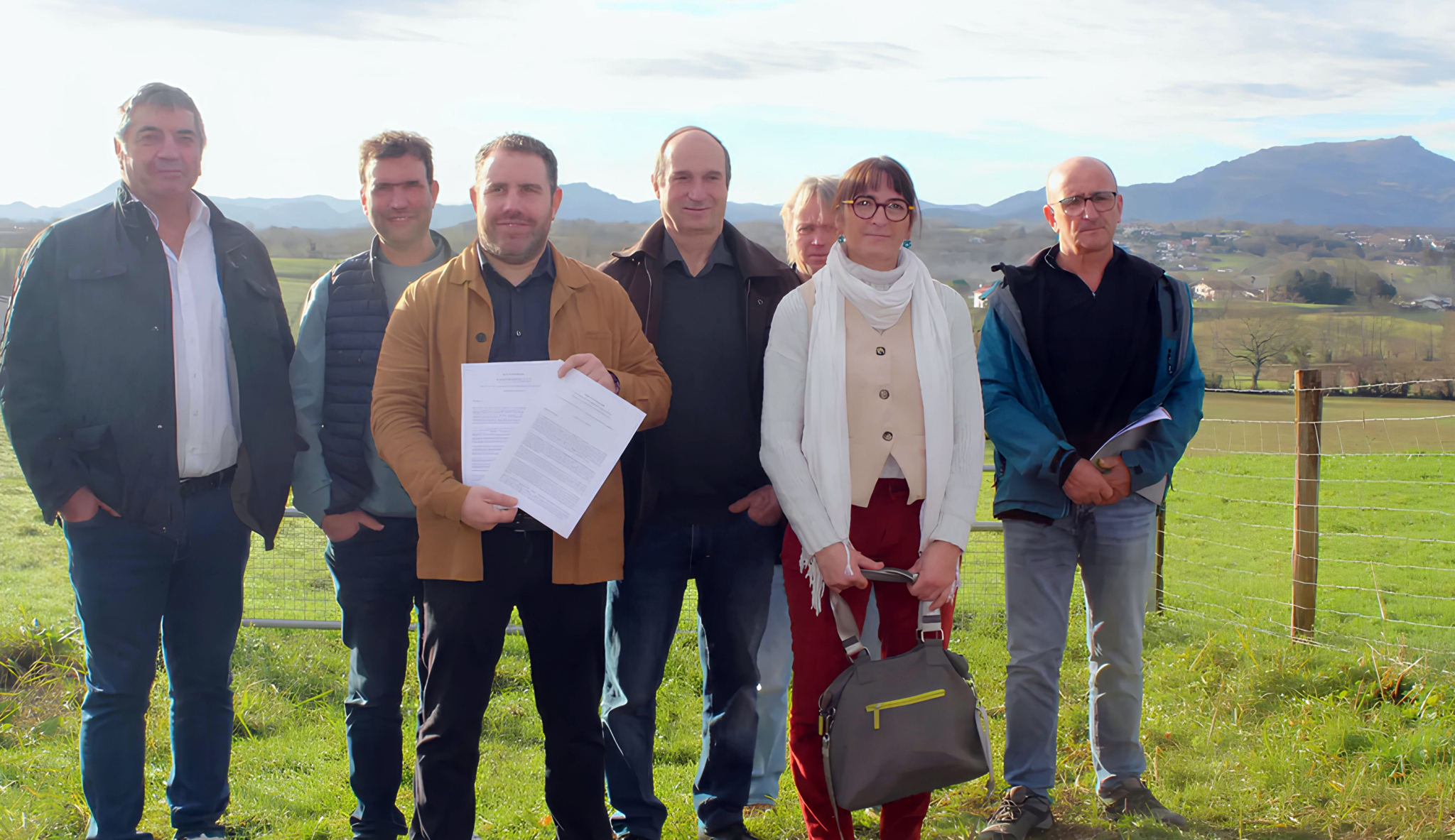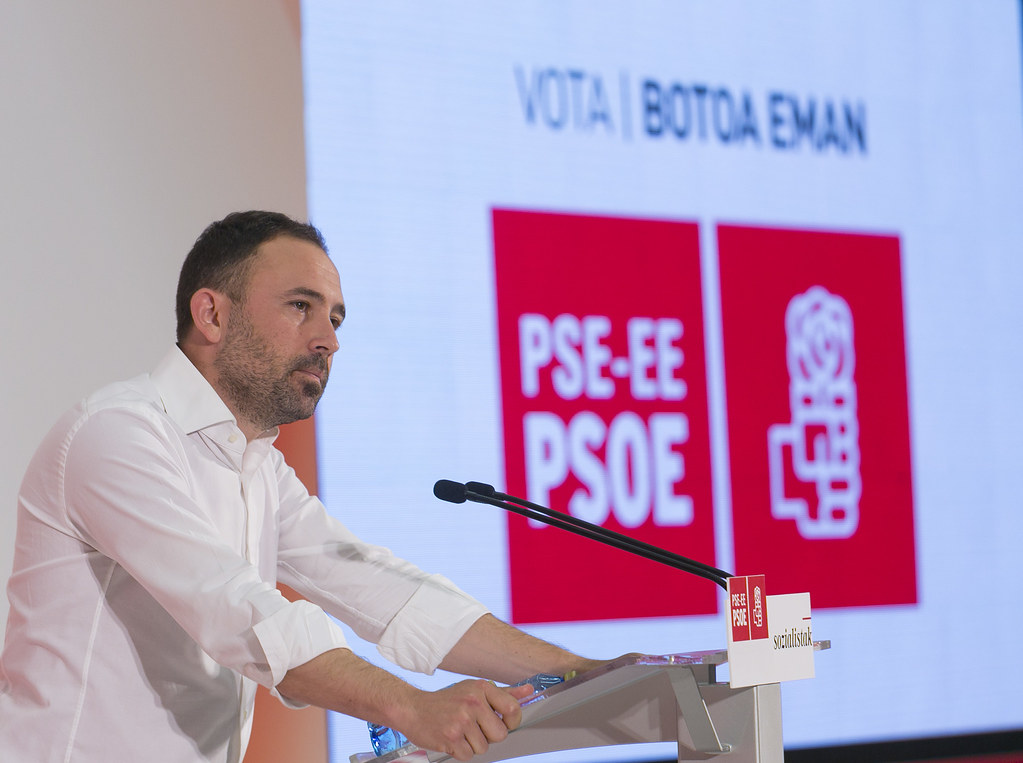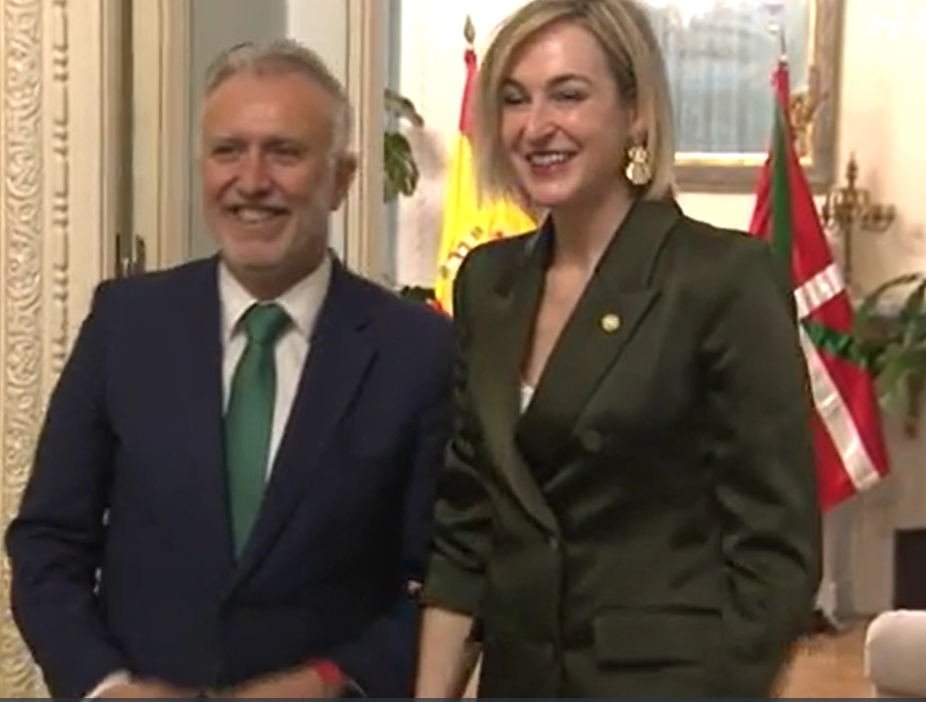"We are working on strategic unity to create the European Communist Party"
- Last December the Socialist Council of Euskal Herria (EHKS) was presented, a party that seeks to structure the Socialist Movement in Euskal Herria. Its aim is the formation of the Communist Party in Europe and the socialist revolution. Peio Ormazabal and Beñat Aldalur explain what it is and what they are doing in the Azpeitia Slave Building, a building occupied by the movement.

They say the SVDC has emerged “in the midst of the capitalist crisis.” When I was a teenager, after the oil crisis, capitalism “was in a life-and-death crisis”; in the 1990s, reconversion and unemployment were about to die equally. It would later have to sink through the explosion of bubbles and, finally, with the financial crisis of 2008. But it's becoming increasingly reinvented and stronger. Beñat Aldalur: If capitalism
has infinite self-regulation mechanisms, this means that it is a reformed system, so the revolutionary perspective loses weight in it. This is what is constantly repeated within Marxism: to what extent is capitalism running out? To what extent can it be directed? The history of capitalism is a history of deepening the crisis, so in the 1970s a lot of talk would be about deindustrialization, and now the issue is still topical.
From the Western point of view, we are talking about the loss of centrality of work. That doesn't mean that from capitalism we're automatically going to socialism, but capitalism puts conditions for another model of society. Therefore, crises are there and capitalism also has mechanisms to alleviate them to delay the capitalist crisis, such as massive indebtedness, financing, wars, wage devaluations...
Peio Ormazabal: When we talk about crisis, we are not talking about the immediate collapse of capitalism, but about a system that constantly reproduces contradictions. Austerity and the offensive against wages are some of the most spectacular mechanisms currently used in ways of self-strengthening. We also see that the war context and the tendency of the authoritarian state have increased; at a time when capital has problems, the imperialist powers are competing against each other for profit.
"Socialdemocracy in general, and the Abertzale left as its hegemonic expression, considers critics and critics phobia attacks"
BEÑAT ALDALUR
So far, the GKS has featured in the Socialist Movement. Is the Socialist Council the way to other areas and ages of society?
P. O. In recent years we have created organizations to respond to specific areas, such as the GKS for young people, the genus Itaia, or Erraki and others. The Socialist Council takes up the spokesman and strategic vision of the entire Socialist Movement. Its aim is to make proposals for problems that we have not so far responded to and to put in place tools that are appropriate to the objectives we set ourselves.
You have now set up the Socialist Council, but then the time for the Communist Party in your vision would come. What is the Council's role at this stage?
B. A. The Socialist Council we have presented is for us a current aspect. In any case, in the strategic language we use, there is also the Communist Party, but for its construction a number of prerequisites must be met which we are not in this situation at the moment. These conditions are: one, that the Communist Party be hegemonic in the working class; and two, that to compete in hegemony with capitalism, that party must be international. The Socialist Council must put the conditions in place to create this situation.
At the moment, on the one hand, the working class is being impoverished and, on the other, political rights are being lost. In this context, its mission is to provide tools to organize the working class and become a hegemonic perspective of communism. If it performs these functions, we will become a Communist Party if all this has an international vision.
.jpg)
How is the GSC structured? Who is a militant? Are there quotas? How do they organize power? B.
A. The general principle is a project based on militancy, beyond the traditional professionalism and institutionalization of political parties. However, there are different levels of militancy and we make its own space for anyone who wants to contribute to the project. We first created the Socialist County Councils, and when we saw that we had enough strength, the council of Euskal Herria. It is structured in seven territories and organized by counties, although not all have the same force.
P. O. We're trying to respond to local problems, for example, we've created self-defense networks in the workplace to deal with that anti-wage offensive, or housing unions to deal with working-class problems. As for funding, we self-finance: cash contribution campaigns, txosnas, voluntary contributions, bond aids, sweepstakes… But money is not essential for the militancy and we understand that spending part of their time on the project is enough to be militants of this project.
And power? How do you decide? B.A. Democratic centralism. On the one hand, the democratic principle, understood as democracy as a qualitative political participation, is very important; if we want a movement that responds to society as a whole, this cannot
be in the hands of a few people, but must involve a broad and qualified militant fabric. And at the same time, it must have centrality in order to respond to the general things and for all the collectives to participate.
You are very reticent about the professionalization of the cadres and about them being salaried. Do you have freedom? B.A. For us, the fundamental principle is that political action does not depend on wage labour, and that the engine of the political process is based on political commitment and the generosity of militancy. Our current dynamic is not with the liberates, but we do not rule out them being released for some specific function, for example for communication or if we
need any lawyer, that is, to perform very specific technical functions.
P. O. Historically, wage dynamics have been a form of putrefaction and assimilation of many revolutionary movements. We do not therefore believe that we are better than our predecessors, and that is why we put the figure of the militant at the centre.
They say that all sectoral struggles must be subject to class struggle and within the socialist organization. This sometimes collides with other sectors like feminism. Is it possible that everyone makes their own way without colliding?
B. A. We have clashed with different ideological approaches, but we collaborate with others, although we surely do not agree on everything. In the case of Palestine, we collaborate with others, also in the world of environmentalism, in the field of women -- to respond to the housing problem P.O. We call
a demonstration with dozens of agents in relation to Income Guarantee Income -- that idea that we are constantly colliding with all people is interested. We are open to cooperation and, if certain conditions are met, it is essential. For example, at the land defence demonstration held two weeks ago in Azpeitia we were there.
B. A. Socialdemocracy in general, and the Abertzale left as its hegemonic expression, considers critics and critics phobia attacks. For us, however, criticism is essential if it is done rationally. In recent years we have spent a lot of time consolidating our base, but now it is also time to work with other actors, and that is what is being seen.
"This idea that we are in constant contact with all people is interested. We are open to collaboration and, if certain conditions are met, it is essential"
PEIO ORMAZABAL
I am referring to the stubborn, not least because you are opposed to the party of the party of the party of the bourgeoisie. On the side of the proletariat, at least you, and on the side of the bourgeoisie, there are other left-wing sectors and also various sectoral areas. Is shock from this perspective almost essential, or?
B. A. The sectoral areas would not include them in the aspect of the bourgeoisie… In any case, this division is a conception of global understanding. We basically say that there is an area in which institutions exercise, understood as a system of reproduction of capitalism, and that to combat it we must create another block in which we too stand. There are hundreds of agents and collectives that are part of the working class and we would like them to accompany us for things of the moment or for strategic alliances. When we talk about the party of the bourgeoisie
P. O. we are talking about political parties that are in the management of the institutions and that participate in the necessary measures for the reproduction of capital. This does not always apply to other trade union and social partners.
You put the socialist revolution in a vision beyond the present states, for example at European level. According to this, a Communist Party should eventually be set up at European level, and within that organisation would be the National Council of the Basque Country? What would their role be?
B. A. This process has universal principles, but it should also pay attention to particular situations. We therefore believe that communism must be the desire of an International, and we believe that steps will be taken in this direction in the coming years. However, the specific declarations of each territory and nation must also be taken into account and, for example, an organisation is given to the oppressed nations of the Spanish State, in the Catalan countries, in Galicia or in the Basque Country. And as this process develops at European level, we will have to see what its form is.
Is that your vision or the vision shared with the newly created Socialist Horitó (Catalan Countries) and the Socialist Youth Coordinator of the Spanish State?
P. O. It is a shared perspective and in the configuration of the Socialist Movement it is gaining strength in Catalan countries, Euskal Herria and Galicia.
Are movements emerging with this concept in Europe?
B. A. Yes, but, of course, we are primarily affecting the nearest territories. It is easier for young Burmese people to share the reflection we have made of young Basques than some Germans. Relations of fraternity or fraternity with the Catalans have been easy, they have also occurred in other territories of the State and in Portugal there are also those who wish to join this process. We believe that if we work well this process will be extended in the short and medium term throughout Europe.
I understand that the epicenter of this new European Socialist Movement is Euskal Herria and the Spanish State. B.
A. Today yes, and although we are in contact with other territories, there is still nothing concrete except with Portugal.
P. O. We are working on strategic unity and not on bilateral relationship. We want to take this process on a sound basis and that takes time if, as we say in the objectives, we create the first outbreak of the Communist Party at European level.
.jpg)
Another very topical issue is the destruction of the planet. They say that the solution can only come from the hand of the socialist project, but, of course, it is a very urgent issue, if we have to wait for the socialist revolution, we may have it. What general steps can be taken from today?
P.O. Taking steps towards green capitalism, institutions are strengthening what they call the energy transition, but carbon emissions data are getting worse and worse. This process is not really being done for the protection of ecosystems and nature, but to increase the profits of some business sectors. We need, therefore, a system that rationally channels natural resources, and doing so within capitalism is impossible, because capitalism has to guarantee profit yes or no. That is why we denounce the farce of the energy transition.
B. A. I believe that most environmentalism is clear that from within capitalism we cannot cope with the destruction of nature. Recognizing this, it is not clear what the post-capitalism situation should be, but we believe that that is communism. Of course, all of this has a great need, because we can get into a situation that has no setback, and then the conditions for building another society are also called into question. We must therefore quickly end capitalism, because otherwise it will lead to an even greater catastrophe.
Within environmentalism there is a great debate about whether deceleration is a solution. How do you see it?
B. A. It is clear that social organization models, including consumption patterns, will need to be changed to ensure sustainable relationships with nature and resources. In this sense, there are different visions about deceleration, some believe that deceleration is something that must be done quickly and others believe that it will be linked to a political project in which it will adapt as a new society is created. We are in that second perspective and have no concrete answers, but as the process progresses concrete answers will emerge.
"We are working on strategic unity and not on bilateral relationship. We want to bring this process on a solid basis and that takes time if, as we say in the objectives, we create the first outbreak of the Communist Party at European level"
PEIO ORMAZABAL
Among its tasks are “the control of all mechanisms that deal with the distribution and consumption of what is produced”. What does that mean in everyday life?
P. O. For a new social organization to succeed, its form and functioning power must be organized in both areas. In other words, what is produced must not be distributed equitably, but we must transform what we produce for the well-being of the majority and not for the private interest. In other words, how health should be, what kind of work should be done in education, how industry should be organised and what should produce...In all of this the communist movement must also be present and not only in the defence of working conditions. In short, an organized labour movement should increasingly be able to exercise its vision in society against the bourgeoisie and the capitalists.
B. A. In our view, in general terms, current society has conditions for the well-being of all people, but to do so it is necessary to banish the power of the international oligarchy and acquire control over the means at its disposal. They give that organization a private, particular and selfish character, and we would like to give it a democratic and universal organization. We believe that today in the world there are conditions for ensuring the well-being of all people outside paid work, and that would be done through a large consumer fund. In other words, people will have to continue working, but they will not be dependent on work.
Koalizio abertzaleko hiru ordezkariek ohar baten bidez euren "frustrazioa" adierazi dute proiektu fotovoltaikoa ezin gelditzeagatik: "Egoera horren aurrean, ez gara legegintzaldia amaitzeko indarrez sentitzen". Proiektu honi ez! plataformak salatu du EH Bilduren... [+]
Arratzua-Ubarrundiako "Proiektu honi ez!" plataformak adierazpen hau kaleratu du, udalerri horretako EH Bilduko hiru zinegotziek dimisioa aurkeztu berritan. Izenburu hau darama testuak: "EH Bilduren moketako politika edo Iparra nola galdu".
Arratzua-Ubarrundia (Araba) herriko EH Bilduko hiru zinegotziek dimisioa eman dute Solariaren zentral fotovoltaikoagatik. Hau da hiru zinegotziek, Txetxu Zengotitabengoak, Laura Sanchok eta Javier Ruiz de Arkautek, herritarrei zuzendu dieten agur mezua.
EH Bildu agintean dagoen udalak gaztetxearen etorkizuna ziurtatzeko aterabide bat adosteari "uko" egin diola salatu du Burlatako Gazte Asanbladak. Beste hainbat gaztek udaletxe kanpoan kanpatu dute, eta goizean zehar bertara hurbiltzeko dei egin dute.
Maite Nosti diputatuak kargua utzi du alderdiarekin izandako desadostasunengatik, eta horrek kide bakar batekin utzi du alderdi faxista, talde mistoan sartzera behartuz.
PPrekin eta EH Bildurekin negoziazioetan porrot egin ondoren etorri da Ahal Dugurekin adostutako akordioa. Indar politiko honek aitortu duenez, maximalismoak atzean utzi eta errealitateari heldu diote, errenta baxueneko herritarren aldeko akordioa lortuta.
203 diputatu alde eta hiru aurka agertu dira martxoaren 11 gauean egin bozketan. Higiezinen agentziak haserre agertu dira, eta bi salaketa aurkeztu ditu FAIN Frantziako Higiezinen Federazio Nazionalak Europako Batzordean. Bata, lege-proposamenari esker botere gehiago jasoko... [+]
Mundua "oso azkar" aldatzen ari dela azaldu du Arnaldo Otegik, militarismorantz eta autoritarismorantz doala, eta norabide horren aurkako jarrera duela koalizio subiranistak.
Plataformak "atzerapausotzat" hartu du Eusko Jaurlaritzako Etxebizitza eta Hiri agendako sailburu Denis Itxasok berriki iragarri izana lurzoru urbanizagarrietako etxe babestuen proportzioa %75etik %60ra jaistea. Pradales agintera iritsi zenetik alokairu soziala eskatzen... [+]
2025 amaitu baino lehen Gernikako Estatutuan jasotzen diren eskumen guztiak izatea espero du Jaurlaritzak. Oraindik 25 eskumen falta dira. Transferentzia Batzordea aurreko astean biltzekoa zen baina "agenda arazoak" zirela eta atzeratu zuten.











